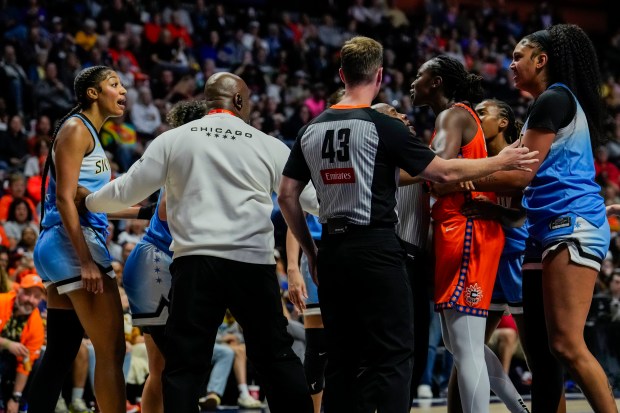President Donald Trump’s administration has filed a lawsuit alleging the state of Illinois is undermining federal immigration laws with a measure passed by the General Assembly last year aimed at protecting the privacy of workers who are non-U.S. citizens.
The lawsuit is the latest challenge to Illinois’ progressive immigration policies from Trump’s Justice Department. Earlier this year, the department sued the state and city of Chicago over so-called sanctuary policies that limit the cooperation of local police with federal law enforcement on immigration matters.
The lawsuit filed Thursday challenges amendments the state made to the state’s Right to Privacy in the Workplace Act, which lays out a number of privacy-related workplace requirements including guidelines that govern employers’ use of systems to check workers’ employment eligibility, such as the federal E-Verify program.
The measure was signed into law in August by Democratic Gov. JB Pritzker after being passed by the General Assembly largely along party lines, although three moderate GOP senators, party leader John Curran of Downers Grove, Donald DeWitte of St. Charles and Seth Lewis of Bartlett, joined Democrats in voting in favor of the measure.
The federal lawsuit alleges that changes made to the state law last year violate the supremacy clause of the U.S. Constitution, which bars state and local governments from impeding the federal government’s ability to enforce federal laws. The Justice Department accuses the state of Illinois, Attorney General Kwame Raoul and Jane Flanagan, the head of the Illinois Department of Labor, of unlawfully carrying out changes to the E-Verify portion of the privacy and workplace law meant to protect workers without U.S. citizenship. Pritzker was not named as a defendant.
The Justice Department is requesting the court to halt enforcement of the state law’s amendments.
“The United States has preeminent authority to regulate the administrative processes governing Form I-9 (federal employment eligibility verification forms) documentation and inspection, and E-Verify,” the Justice Department wrote. “Illinois therefore has no authority to enforce laws that obstruct or otherwise conflict with federal immigration enforcement efforts by imposing additional regulations, requirements, and possible sanctions on employers that seek to participate in the federal ‘E-Verify’ program.”
Raoul’s office said it was reviewing the lawsuit and had no further comment. A spokesperson for the state’s Labor Department said in an email the agency is “committed to protecting the employment rights of all Illinoisans and upholding federal and state laws” but declined further comment.
Two Chicago Democratic lawmakers who sponsored the amendments issued statements Friday defending the measures and calling the lawsuit “politically-motivated.”
“The Illinois law I sponsored was crafted to provide workers and employers with a clear process. Nothing in that law restricts the use of the e-verify system,” said state Rep. Eva-Dina Delgado. “I have full faith in the judicial process and expect the law will be upheld.”
“States have always maintained the authority to regulate working conditions and employment rights when not in conflict with federal statutes — a fundamental principle that the DOJ seems determined to ignore,” said state Sen. Javier Cervantes. “What our law does is ensure transparency and fairness in employment verification while fully respecting federal authority.”
An employer can use E-Verify to electronically compare the information the employer enters from an employee’s Form I-9, or employment eligibility verification form, to records already available to the Social Security Administration and the U.S. Department of Homeland Security. The verification check would notify the employer of a mismatch and prompt further action by the employee to confirm employment eligibility.
The amendments to the Right to Privacy in the Workplace Act, which took effect Jan. 1, include a provision that requires employers to let workers know within 72 hours of any inspections being conducted by federal immigration enforcement of Form I-9s or other employment records.
The amendment also states that employers “shall not impose work authorization verification or reverification requirements greater than those required by federal law.” Employers found to be in violation are subject to fines.
The lawsuit takes issue with the civil penalties as well as the advance notice requirements.
“Not only are these fines inconsistent with federal law, but such advance notice requirements could prompt an alien employee to not show up to work on the day of inspection or avoid detection by immigration authorities,” the lawsuit states.




